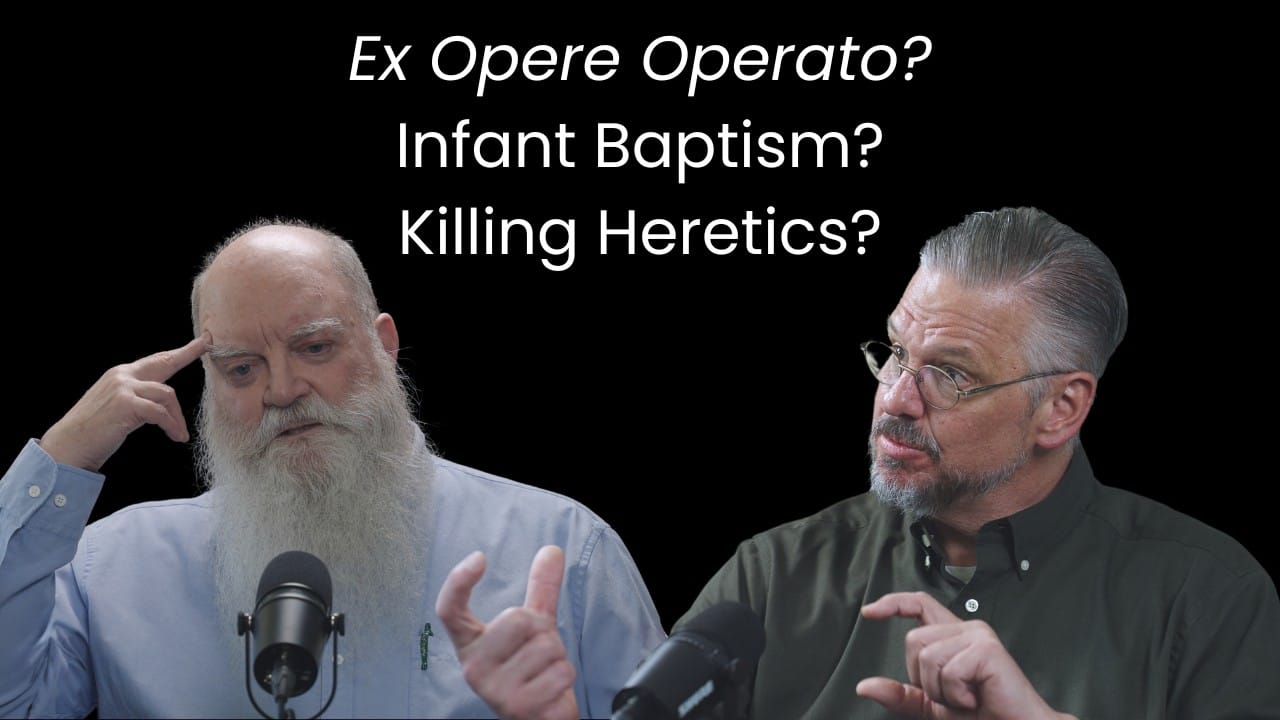Husbands, Wives, and the Arsenal of Jesus’ Sacrificial Kingdom
Paul’s letter to the Ephesians calls believers to submit to each other in the phobos (fear, reverence) of Christ. It also calls believers to love each other “as Christ loved us and gave himself for us” and to treat each other as members of the same body. The letter then takes these commands for all believers and specifically applies self-giving love to husbands and reverent submission to wives. How are we to understand this? Do wives not need to love their husbands? Do husbands not need to submit to their wives?
We ask these questions and find ourselves at the intersection of two explosive issues. One is the nature of Christian submission, the other the nature of marriage. My goal is to explore biblical submission in enough depth that we can apply a robustly Christian understanding of submission to this text on marriage. Submission is a paradoxical, surprising, and powerful weapon in the arsenal of Jesus’ sacrificial kingdom. It is far more interesting than common views of submission which fall short, to greater or lesser extents, of the gospel of the kingdom.
Three Views of Submission that Fall Short
One view steamrolls all relationships where submission is called for into a common pattern of authority structures. If wives should submit to husbands, that is because husbands are authorities. If slaves should submit to masters that is because masters are authorities. And so on down the list. Submission and obedience also get lumped together as essentially the same response to God’s order of authority. God, governments, slave masters (or employers), husbands, parents, and church elders are all considered to have roughly the same type of authority which calls for roughly the same type of submission or obedience by those under them. Such views can be quite dangerous in allowing and sanctioning abuse. But usually, people who look at submission this way will emphasize safeguards, such as remembering that God is the highest authority and being alert against abuse.
A second view sees New Testament submission texts as concessions to the necessities of society. While believers may be spiritually equal, hierarchies are socially necessary. In one version, the household codes in the epistles show the church backing off from the radical egalitarianism of early Jesus followers as the Church realized Jesus might not return in their lifetime. Others see these instructions as accommodations to the prevailing culture of the times. Paul told slaves to submit to their masters because abolition was not practical. He told wives to submit to their husbands because the culture expected it.
A third understanding takes the phrase “submitting to one another” as the full statement. In this view, the New Testament does not teach any difference between a wife submitting to a husband and a husband to a wife. This egalitarian view of marriage is often paired with an egalitarian view of men and women in the church, where all offices of the church are open to both men and women.
Submission as Virtue and Weapon in Jesus’ Sacrificial Kingdom
Submission is a virtue and a weapon in Jesus’ sacrificial kingdom. Within this context we can think about submission in a way that avoids the three deficient approaches mentioned above. Submission reflects a kingdom way of relating to God and other people, and serves as a weapon to overcome evil with good. Submission is both for healthy relationships that match God’s intent and for responding to relationships like slavery that violate God’s good intent.
1 Peter takes Jesus’ example and uses it to call believers to submission across a wide range of relationships. Slaves with evil masters are called to submit in the phobos (fear, reverence) of God “because Christ suffered for you, leaving you an example, that you should follow in his steps. … When they hurled their insults at him, he did not retaliate; when he suffered, he made no threats. Instead, he entrusted himself to him who judges justly.” (1 Peter 2:21-23) Here submission is a Christlike response to evil. It is not about recognizing the masters as rightful authorities. Slavery, whatever its level of brutality, violates God’s intent, just as the treatment Jesus received exemplified evil. But Jesus bore our sins in his body, and believers also receive glory when they respond similarly to unjust treatment.
Jesus’s example of loving others, being willing to suffer, and entrusting himself to God anchors the entire center section of Peter’s letter from 2:11 to 3:17. This passage covers relationships with all people: emperors, governors, slave masters, husbands (both word-obeying and word-disobeying), wives, the church, and those who persecute believers. The example of Christ provides a way to deal with all these relationships. “Finally, all of you, have unity of mind, sympathy, brotherly love, a tender heart, and a humble mind. Do not repay evil for evil or reviling for reviling, but on the contrary, bless, for to this you were called, that you may obtain a blessing.” (3:8-9)
Whether it is believers submitting to governments and silencing the claims of their adversaries by doing good, or slaves submitting to masters, or wives winning word-disobeying husbands by their good conduct, or believers answering their persecutors with gentleness and reverence; submission intersects with overcoming evil with good.
When we read passages like this, we must be careful to hear the whole passage, or we are in danger of legitimating evil. Consider the titles of two talks at a recent abuse prevention seminar by Lifering Ministries. One was “The Importance of Holding a Theology of Oppression with a Theology of Suffering,” another was “The Interaction of Peace Theology and Domestic Abuse.” I was not there, and I don’t know what the speaker said about the topics. I mention the titles simply because they expose the dangers of naively emphasizing submission and acceptance of suffering. Biblical submission does not mean we should never flee from evil, and it must not be twisted to justify evil or paint evildoers as the ones in the right.
Peter anchors our approach to human relationships in our overriding identity as belonging to God. Jesus entrusted himself to God in the face of suffering. We live as people who are free. We are not slaves to anything, but we consider ourselves slaves of God who is the only rightful master. Given this fundamental identity, we can honor and care for others, but we do not cower before them. This is made vivid with Peter’s emphasis on phobos. This Greek term is variously translated in our English Bibles as “fear,” “reverence,” or “respect.” Submission and phobos are consistently paired. However, while we submit to people, we render phobos to God.
As the saying goes, “He who fears God, need fear none other.” The fear or reverence of God displaces our fear of human beings, yet at the same time allows us to relate to them in a reverent or respectful way. Wives might win their word-disobeying husbands by their pure “in-phobos” conduct, submitting without being frightened. More generally, believers have no phobos (fear) of those who persecute them but are ready to render an apologetic with gentleness and phobos (respect) to those who ask.
“Honor everyone, love the family of believers, fear God, honor the emperor.” (1 Peter 2:17)
Peter does not use the specific wording of mutual submission. But it does paint submission in various relationships as an example of the general Christian posture toward fellow believers, as well as toward unbelievers. It is a manifestation of gentleness, humility, and respect. This same pattern comes back up in 1 Peter 5. Elders are urged to shepherd the flock without lording it over them, but instead by being examples to the flock. “Likewise,” the younger are to submit to the elders. All believers are to be clothed with humility toward each other.
The instruction to submit to someone does not mean that the person submitted to has rightful authority. Slavery is not a relationship that should exist. Other relationships where believers are told to submit are also distorted from God’s good intention. The emperor and governor exercise un-Christlike power and violence. Some husbands “do not obey the word.” And, of course, the people from who Jesus accepted bad treatment were thoroughly in the wrong.
Neither are Peter’s instructions to submit simply a concession to societal expectations. Submission is rather part of a thoroughly Jesus shaped response to evil. This response is rooted in the imitation of Christ, the trust of God, and our identity as God’s slaves. It is a weapon in Jesus’ sacrificial kingdom that leads to Jesus bearing our sin; to the ignorance of foolish people being silenced; to husbands being won without a word; and gentle, reverent apologetics.
Nor does Peter say that within the body of believers all submission should be completely symmetrical. The younger submit to the elders in ways that the elders do not submit to the younger. There is no reason to think that Peter’s call to submit to elders is about overcoming the evil deeds of the elders with love. Rather, it is part of God’s good intent for human community. Peter’s instruction to wives does have an element of overcoming evil with good, or at least of dealing with less-than-optimal husbands in the phobos of Christ. The passage also indicates, especially when compared with Ephesians, that within marriage as God intends it there is a certain asymmetry of submission.
Husbands, Wives, and Ephesians
Being filled with the Spirit means believers submit to each other in the phobos of Christ. This is dynamite. The same thing that is used to deal with enemies and slave masters, which is also directed toward God and toward Godly elders, is to be mutually and reciprocally given among believers. Since this mutual submission is the foundation for the discussion of husbands and wives, some Christians argue that when marriage is functioning properly there should be no non-symmetrical submission. They correctly note that sin often distorts marriage toward male dominance. It has been all too common for women to be viewed as the property of men. It is all too common for men to see wives as people to whom they should issue commands. It is too common for men to treat women as less capable of making good decisions. Those problems need addressed and asserting that there should be no non-symmetrical submission is one way of addressing them. However, I do not think that the text supports that assertion.
Paul compares marriage to the head-body relationship of Jesus and the church. Within that same comparison, husbands are specifically charged to demonstrate self-giving love toward their wives. This means that husbands and wives are to receive specific applications of behaviors that apply to all believers. Just as all believers submit to each other, so also all believers are to treat each other as their own body. We are to “Walk in love as Christ loved us and gave himself for us.” Ephesians 5:2) We are to “Speak truth each one with his neighbor, for we are members of each other.” (Ephesians 4:25) “The members have the same care for each other. If one member suffers, all suffer; if one member is glorified, all the members share in rejoicing.” (1 Corinthians 12:25-26) Within the picture that is marriage, the commands to love and submission are given specific applications. Wives are called to a non-symmetrical submission. Husbands are called to a non-symmetrical self-giving love.
Our Christ-like love extends to everyone, enemies included. Our posture of submission also extends to enemies. Within the body of Christ, both are intensified. My brothers and sisters are, like me, parts of Christ’s body. They are people to whom I submit out of reverence for the Christ who dwells in them. Marriage is then, simply an even more specific case where love and submission are practiced. The husband gets to model the head in loving, giving, and care for his wife. The wife is to model the part of the church not only in submitting to her husband, but in demonstrating phobos toward him. This indicates that her submission is different from the general mutual submission where believers submit in the phobos of Christ.
Nonetheless, the picture that is marriage does not say everything there is to say about the relationship between a husband and a wife. We must not read more than we should into the comparison. As Paul says in 1 Corinthians 11, “Nonetheless man is not apart from woman, or woman apart from man in the Lord. For as the woman is from man, so also the man is through woman, and everything is from God.” Husbands and wives are also fellow humans, and if both believe, they are fellow saints. Marriage does not take away her need to love him as a brother, or his need to submit to her as a saint.








Leave a Reply